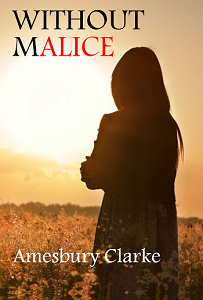| Book Spiel | Trailers | Book Club Discussion Points | Purchase |
Without MAlice, by Amesbury Clarke

Genre/Categories/Themes:
Mystery, Romance, Mental Health, Psychological, Trauma, Loss, Bereavement, Emotional Strength, Resilence.
Pages: 313 - Word Count: 92167
Overview:
Her mum looks after her, and she looks after her mum. A loving daughter who suffers the mental scars from a traumatic childhood tragedy, and a widowed mother who fights to remain strong for the sake of her daughter.
Without MAlice will tug at the strings of your heart, reminding of the delights which human empathy can achieve.
Remove the 'M' from Malice and you have the name of our lead character, Alice, a kind natured and well humoured 21 year old who suffers repressed trauma from a harrowing past.
Arthur, the deceased father of the family, looks down from heaven, unable to speak to the loving family he has left behind, knowing that they have not forgotten him, as the dead are only able to see the living when they are in their hearts and in their thoughts.
Observing fleeting glimpses of the struggles and tribulations of his daughter and his wife, Arthur's mind is tortured in his heartbreak of being unable to intervene or help, yearning more than ever to hold his loving family near and reassure them that everything is going to be ok.
Thriving on the love and strength of her friends, Alice struggles with mental illness under the care of her regular consultant Dr Chivers at the foreboding Grange House, a local clinic for patients whose ailments are a little, shall we say, different...
Alice's progress has been stalling of late. That is until the esteemed Dr Reubenstein arrives in town, and things begin to take a sinister twist.
Aided and abetted by a blossoming love interest, Pete the boy next door, whom the rest of the people in town for some reason don't seem to approve of, Alice seeks to unravel the darker secrets of the new doctor, and the work being conducted at Grange House.
You'll laugh, you'll cry, you'll fall in and out of love, and then do it all again. An emotional journey of loss, joy, tragedy, deceit and hope.
A heart-warming tale. Witty, charming and delightful, with characters you can't help but fall in love with.
A tale which reminds us we are human, and teaches us to appreciate the love and support of those closest to our hearts.
Book Trailer
Book Trailer 2 (Ambience Version)
Extended Book Trailer
"Without MAlice"
20 BOOK-CLUB DISCUSSION POINTS
(Compiled and shared by kind permission from 'Bee-Green Charlotte')
*WARNING: May contain potential spoilers.

--------------------------------------
1. What were your feelings about Grange House? Was it a place you'd like to avoid, a place of trust and support, or the sort of spooky setting you'd expect to find in a horror movie?
--------------------------------------
2. Loneliness is a key theme in the story, depicted by Alice having conversations with a sparrow and some of her departed friends. Are there any other examples of loneliness and how it links to Alice's illness?
--------------------------------------
3. Alice and Pete often bounce things off each other, their conversations are usually laced with light-hearted humour and friendly-teasing. The Tom Jones conversation, Pete's over-sized jumper, the moon being made from cheese, calling the bench 'Ben', etc. Which was your favourite Pete/Alice conversation?
--------------------------------------
4. Judith is a very strong female character and a shining example to other women, tough and able to selflessly display external-strength for the sake of others. Would you agree with this?
--------------------------------------
5. Be honest, did you cry at chapter 15?
--------------------------------------
6. There are several inanimate characters in the book, such as Grange House, the bridge where the accident occurred, and Beau Bear. Are there any more inanimate characters, and how significant is each to the story?
--------------------------------------
7. What did you think of Dr Chivers and Dr Reubenstein? Did you picture them as friendly and approachable, or sinister and foreboding?
--------------------------------------
8. Alice and her mother, Judith, depend on each other greatly. But who depends on who the most?
--------------------------------------
9. Upon learning the full extent of Alice's illness, how does this make you feel about the rest of the townsfolk? eg, the other children's parents, the coffee-shop owner, the librarian, etc. All of these people know the details of Alice's condition. How does this affect their behaviour towards her, and what does it say about them as people?
--------------------------------------
10. The book concludes by jumping forward 4 years. By this point is Alice cured? Will she live a normal life moving forward?
--------------------------------------
11. Nostalgia is a recurring theme in setting the atmosphere/mood. What were your thoughts about Judith discussing her old Polaroid photographs and the Tarpan? And what impact do the nostalgia boxes in the cupboard have on Alice's illness?
--------------------------------------
12. How important was the bonding scene where Alice and Judith ride on the swings? What is the significance of this scene? How does it tie in with the scene about Judith's hat?
--------------------------------------
13. The story is narrated by Arthur, Judith's deceased husband, depicting the subject of loss and bereavement from another angle. Did this character enhance the story or detract from the main action?
--------------------------------------
14. The doctors intentions were to help Alice. But did they succeed? Would you consider their treatment to be a success or a failure?
--------------------------------------
15. At which parts of the story did you connect the book's title to the events taking place?
--------------------------------------
16. The love scene between Alice and Pete is written very much as 'fade to black'. Is this the best way to write a love scene, or is more detail required? Would a longer and more graphic scene improve the book, or would it be viewed as unnecessary in supporting the story?
--------------------------------------
17. How did you feel whilst reading Alice's description of the bus-crash?
--------------------------------------
18. At any point did you figure out the main symptom of Alice's condition? If so, which parts of the story gave you clues? Or looking back in hindsight, which clues did you miss?
--------------------------------------
19. Are there any similar books which you'd place this one next too, and why? Similar characters, similar themes, similar twists, writing style, etc.
--------------------------------------
20. Who were your favourite 3 characters (in order) and why?

Purchase





